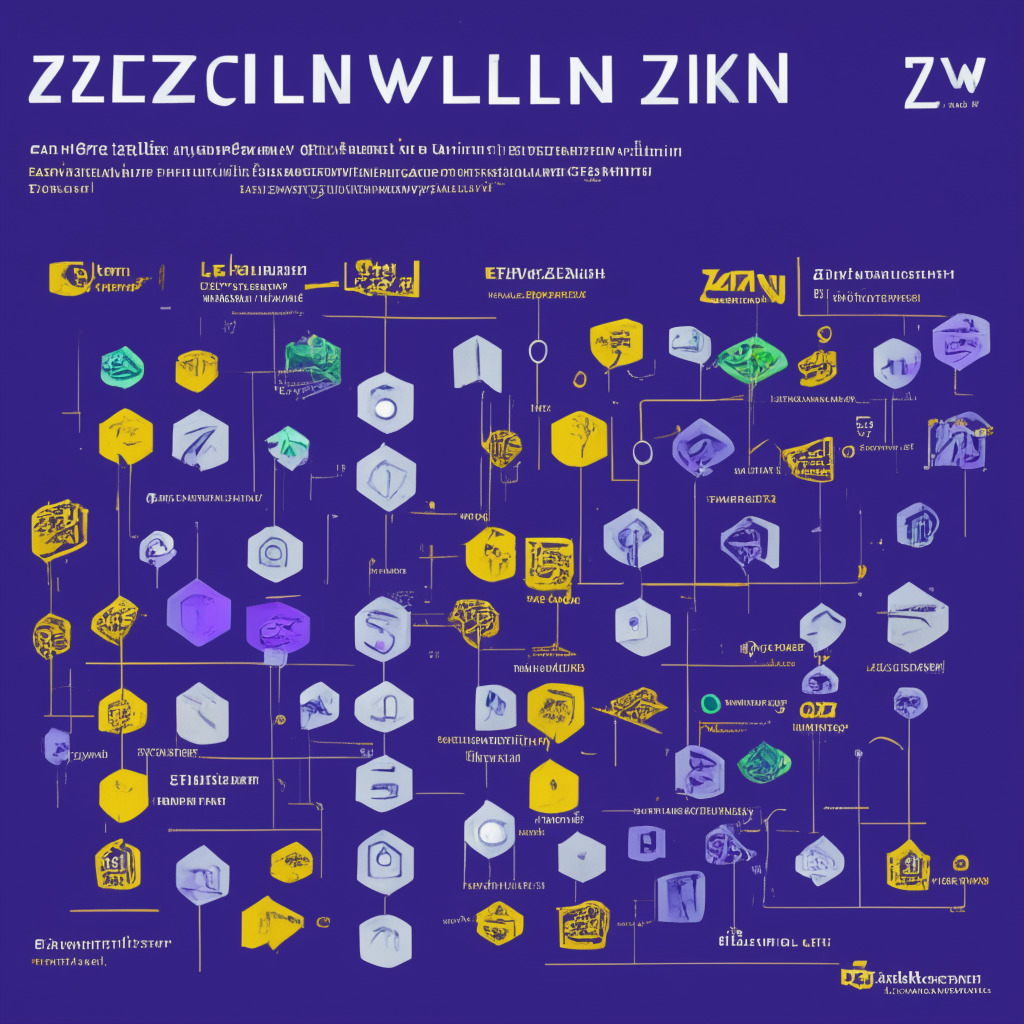Singapore-based QCP Capital and Japan-based SBI Alpha Trading executed the first-ever crypto options trade without a clearing house, using bitcoin as collateral on the UK-based Clear Market. The groundbreaking transaction utilized multi-custodian collateral network and innovative risk management techniques to mitigate counterparty risks, aligning with the International Swaps and Derivatives Association’s requirements for uncleared derivatives.
Search Results for: SEPA
Polygon 2.0: zkEVM Validium Upgrade for Improved PoS Chain – Pros, Cons, and Conflict
Polygon Labs proposes upgrading its proof-of-stake (PoS) chain to a zkEVM validium to improve security and performance. The upgrade addresses issues like fast block times affecting gas estimation and chain reorgs while integrating zero-knowledge proofs into the infrastructure. Implementation is expected by Q1 2024 if accepted.
Binance Lawsuit: Global Expansion at Risk and Crypto Regulation Dilemmas
The SEC lawsuit against Binance raises concerns about the company’s global plans and highlights the need for clear regulatory guidelines in the crypto industry. The case underscores the importance of compliance, transparency, and balancing innovation with customer safety, providing trust and stability for the industry’s growth.
Unified Ledger: Merging CBDCs and Tokenized Assets for a Financial Revolution
The future of finance could involve a unified electronic ledger merging central bank digital currencies with tokenized assets, streamlining transactions and improving global financial systems, according to a Bank for International Settlements report. Key benefits include automated smart contracts, reduced trade costs, and seamless cross-border operations.
Flashbots Personnel Shake-Up Amid $1 Billion Valuation: Debating the Future of MEV & Blockchain
Crypto research and development firm Flashbots experiences major personnel changes amid raising funds at a $1 billion valuation. The company, known for its MEV-Boost middleware, faces challenges and aims to develop the SUAVE network, offering more accessible MEV extraction features to other blockchains.
Polygon PoS Upgrade to zkEVM Validium: Security vs Scalability vs Decentralization Debate
Polygon co-founder Mihailo Bjelic proposes an upgrade to the Polygon PoS network, suggesting a shift to a “zkEVM validium” version for increased security through zero-knowledge proofs. This upgrade would enable Polygon zkEVM for high-value transactions, offering lower fees and enhanced security from Ethereum’s features, targeting applications like Web3 gaming and social media.
EDX Markets: A Game Changer for Crypto, Traditional Finance Giants Enter the Fray
EDX Markets, a digital asset market backed by Fidelity Digital Assets, Charles Schwab, and Citadel Securities, aims to bring competition, transparency, fairness, and safety to the crypto space. Unlike other exchanges, EDX Markets doesn’t custody customer assets and requires users to rely on financial intermediaries, appealing to regulators.
Ethereum Explorer Etherscan Integrates AI: A Boost to Blockchain R&D or Risky Move?
Ethereum blockchain explorer Etherscan has integrated AI technology in its newly launched Code Reader beta version, aiming to simplify blockchain research and development. Etherscan’s AI-powered Code Reader allows users to understand smart contract integration with decentralized applications, though potential inaccuracies warrant cautious use and verification.
SEC Crackdown on Crypto Exchanges: Hindrance to Innovation or Necessary Oversight?
Former CFTC Chairman Christopher Giancarlo and crypto advocate Jim Harper discuss the SEC’s recent crackdown on Coinbase Exchange, highlighting the need for regulatory clarity in the U.S. crypto industry. The pursuit of a positive regulatory environment is crucial in propelling the market forward and fostering innovation.
Deutsche Bank Goes Crypto: Exploring Their Move into Digital Asset Custody and Its Implications
Deutsche Bank, Germany’s largest banking institution, has applied for a digital asset custody license with BaFin, aiming to expand its digital asset custody services, including cryptocurrencies. This marks a shift from the bank’s previous critical stance toward the volatile and unpredictable crypto market.
IMF’s Vision for a Global CBDC System: Revolutionizing Cross-Border Payments
IMF’s Tobias Adrian proposes a global central bank digital currency (CBDC) system called “XC” platform, aiming to address issues such as high costs and slow processing in cross-border payments. Utilizing a trusted global ledger, the system enables efficient international transactions without introducing middleware cryptocurrencies, while automating contracts and maintaining central banks’ control over reserve allocation.
IMF’s Role in the Future of CBDCs: Pros, Cons, and Global Regulatory Debate
The IMF is working on a global infrastructure for interoperability between central bank digital currencies (CBDCs) to prevent underutilization. Meanwhile, France’s AMF advocates globally coordinated rules for DeFi, and Ethereum developers consider raising the maximum validator balance for network efficiency.
Alibaba Leadership Shuffle: A Step Towards Crypto Adoption in China?
Alibaba’s founder Joseph Tsai, a known cryptocurrency proponent, will become Chairman in September amid company reorganization. This move sparks interest among crypto enthusiasts, suggesting Alibaba might be preparing for potential cryptocurrency and Web3 developments in China.
Etherscan Integrates ChatGPT: AI’s Role in Blockchain Analysis and the Risk of Hallucination
Etherscan has integrated ChatGPT into its platform, introducing the Code Reader for better Ethereum blockchain analysis. While AI advancements improve data processing, users should exercise caution and verify information, as AI-generated false content or “hallucinations” remain a concern.
Ethereum Validator Changes: Impact on Tokenomics, Investors, and Decentralization Debate
Ethereum developers propose changes to validator requirements, aiming to facilitate future consensus layer upgrades and impact Ethereum tokenomics. The proposal assesses whether increasing the max effective balance of Ethereum validators can lead to operational benefits and better support for the blockchain throughout future updates. Skeptics argue this could lead to centralization and challenges for smaller validators.
Crypto Exchange Internal Trading Raises Fairness Concerns: Pros, Cons, and Main Conflict
Singapore-based cryptocurrency exchange Crypto.com is facing scrutiny for using internal teams for proprietary trading and market-making, raising concerns of potential conflicts of interest and fairness on the platform. This revelation highlights the need for transparency and impartiality in major cryptocurrency exchanges as the industry seeks mainstream adoption.
Wyre’s Closure Raises Questions for Crypto Payments Firms: A Decade’s Worth of Lessons Learned
Crypto payments firm Wyre is winding down operations due to market conditions, ensuring the security of customer assets as it processes withdrawals until July 14th. Wyre’s closure raises questions about the future of crypto payment firms and related infrastructure, amidst ongoing industry uncertainties.
Crypto Exchanges Under Fire: Internal Market-Making Practices and Controversy
Sources claim that Singapore-based exchange Crypto.com uses internal teams to trade tokens for profits, differing from typical market practices. US regulators are increasingly scrutinizing exchanges supporting internal market-making activities, as seen with the SEC charging Binance recently. Crypto.com defends its practices, stating that it operates on a level playing field and focuses on improving liquidity and market efficiency.
Coinbase Frustrated with SEC Evasion: Legal Battle Impact on Crypto Industry
Coinbase criticizes the SEC for avoiding clear answers in an ongoing legal battle and calls for a regulatory framework for digital assets. Coinbase claims the SEC’s silence, delays, and enforcement actions are causing irreversible damage to the crypto industry.
Binance and Binance.US Split: Future of Crypto Exchanges Amid Evolving Regulation
The US District Court has approved an agreement between Binance, Binance.US, and the SEC, enforcing separation between the two entities and barring Binance Global officials from accessing Binance.US customer funds, private keys, and internal systems. This development raises questions about the future of global crypto exchanges under evolving regulation.
Institutional Investors Embrace Crypto: Diversification, All-Weather Income, and Global Perspectives
A major global study reveals pension funds, fund managers, and other institutional investors’ positive outlook on digital assets, with 96% viewing them as diversification opportunities. Increasing understanding of cryptocurrency among institutions indicates greater awareness and education globally, highlighting constructive approaches from financial centers to integrate blockchain technology into existing systems.
Ethereum Downturn: Will Buyers Initiate a Recovery Rally or Face Further Decline?
Ethereum experienced a 15% decline in market value in June, reaching a low of $1624.65. However, it found support along a trendline that has been crucial for maintaining its price uptrend. The falling price may present opportunities for buyers if maintained above the trendline, with prospects for recovering past $2140 peak. The future trajectory remains uncertain, so thorough market research is vital.
DeFi Bounties: Encouraging Hackers or Protecting Funds? The Sturdy Finance Dilemma
Sturdy Finance reopens stablecoin market after an $800,000 exploit, offering a $100,000 bounty for the attacker’s assistance in recovering funds. The incident sparks debate on whether bounties deter malicious actors or attract potential attackers, while hackers develop tactics to hide stolen funds.
FTX Founder’s Double Trial: Implications for Crypto Exchange and Regulatory Future
FTX founder Sam Bankman-Fried faces two criminal trials involving 13 offenses, including fraud and bribery. Charges affect the cryptocurrency exchange and Alameda Research, with wider implications on the crypto industry and increased regulatory scrutiny. The outcome may shape future regulatory decisions, urging vigilance in assessing market players and continuous education on digital assets for the community.
OKCoin’s FDIC Misstep: What It Means for Crypto Consumer Protection and Industry Transparency
The U.S. FDIC issued a demand to cryptocurrency exchange OKCoin for misleading statements suggesting FDIC protection on customers’ accounts. This highlights the need for accurate communication and transparency, as well as adherence to regulations, in the rapidly evolving crypto industry.
MakerDAO’s DAI Rate Hike & Shift to Real-World Assets: Implications for Stablecoins
MakerDAO approved a DAI Savings Rate increase from 1% to 3.49% and rearranged DAI stablecoin’s backing assets. By investing in real-world assets like short-term U.S. government bonds, Maker aims to bridge cryptocurrency with real-world assets, impacting other stablecoins’ market standing like USDP and GUSD.
CoinEx Settlement: NY Crackdown on Crypto Firms, Investor Protection vs. Stifling Innovation
CoinEx reached a settlement with New York Attorney General Letitia James, refunding $1.7 million to investors and facing penalties and a ban from operating in New York. James warns other crypto firms of similar repercussions and emphasizes crackdown on companies misleading investors, ensuring transparency and safety within the blockchain and cryptocurrency market.
Dubai: The Emerging Epicenter of Crypto Innovation and Regulation
OKX Middle East receives an MVP Preparatory license from Dubai Virtual Assets Regulatory Authority, preparing for its license to become operational. The exchange plans to offer spot, derivatives, and fiat services, and recognizes Dubai’s comprehensive regulation standards as crucial to their regional strategy.
Whale Dumps 972 Billion PEPE Tokens: Insider Trading or Market Instability?
A significant whale transaction involving 972.84 billion PEPE tokens has been reported by On-Chain Analysis platform Lookonchain, sparking insider trading speculations and coinciding with a decline in the token’s value. Recent whale activity has seemingly exacerbated the bearish outlook for the once-trending memecoin. As always, thorough market research is crucial before investing in cryptocurrencies.
SEC’s Crypto Rule Change: Balancing Innovation and Regulation in a Complex Landscape
The complex regulatory landscape surrounding the crypto industry faces pushback from House Financial Services Committee Republicans, who urge the SEC to rescind a proposed rule change on defining “exchange.” Opponents argue that the SEC’s overreach hinders innovation and technological advancements within the digital asset ecosystem, further impacting the broader U.S. economy.
Blockchain’s Role in Film Industry: A Creative Revolution or Risk to Artistic Freedom?
The documentary “Bad Like Brooklyn Dancehall” highlights the connection between dancehall music and blockchain technology, as it was supported by Decentralized Pictures, a nonprofit using crypto tokens and community voting to fund cinematic arts. The film’s production explores the potential of marrying artistic creations and blockchain, showcasing the pros and cons of this intersection.
SEC’s Impossible Registration Demands: The Debate on DEX Regulation and Cryptocurrency Authority
Coinbase Chief Legal Officer Paul Grewal opposes the SEC’s proposed rule change requiring decentralized exchanges (DEXes) to register, saying it’s impossible and fundamentally flawed. The rule change extends SEC authority to products ill-equipped for regulatory requirements and has been criticized by US lawmakers and crypto advocacy groups.































